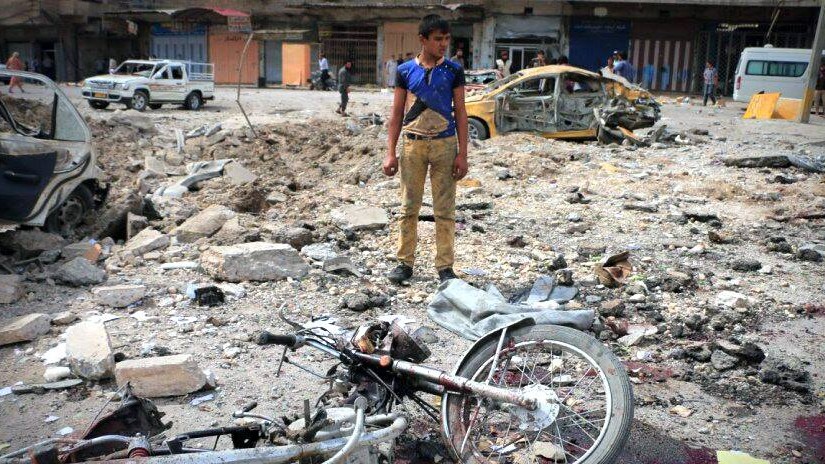STOP THE WAR! SOLUTIONS TO THE MIDDLE EAST CRISIS
We, the undersigned, call on the world governments:
- to stop aerial bombings of conflict territories in Syria and other Arab countries;
- to stop delivering weapons to any parties in the military conflicts of the Middle East;
- to subject international weapons deals to a public discussion in the media and to an approval by their national parliaments;
- to discuss and implement measures to prevent illegal weapon deliveries;
- to cease involvement in international military operations that are not supported by UN resolutions;
- to transfer money directly to low-income countries, to invest in their local educational institutions, and to enable technology transfer to low-income countries.

Background
The civil war in Syria, as well as other ongoing military conflicts in Arab countries, have claimed lives of hundreds of thousands and sent millions of people to seek refuge in other countries, causing a major refugee crisis in Europe. We, citizens of different countries, watch with concern how the world’s political elites are trying to resolve this crisis. Unfortunately, their efforts are misguided, both ethically and rationally, and can provoke a further escalation.
We appeal to the governments of the world, especially of the USA, the European Union, and Russia, which may play decisive roles in the unfolding and resolving of the Middle East crisis.
1. We urge you to STOP AIR BOMBINGS OF CONFLICT TERRITORIES IN SYRIA AND OTHER ARAB COUNTRIES. These military offensives are ineffective, because it is impossible to extinguish terrorist groups such as the so-called Islamic State through such means. They are also unethical, because air strikes inevitably hit civilians in the conflict region. Every civilian death incurred by your air forces on the territory of Arab countries can be used to promote the story about the West conducting a crusade war against the Arabs and draw ever more supporters to radical groups such as the so-called Islamic State.
2. We urge you to STOP DELIVERING WEAPONS to any side of the current military conflicts in Arab countries, including any countries that might be suspect of a direct military involvement there or that might be re-delivering weapons into the conflict regions. It is of course difficult not to deliver weapons to your allies while someone else is delivering weapons to the enemies of your allies. However, this is precisely the situation where a dialogue and cooperation yield benefits to all parties involved, whereas mutual mistrust and competition lead to losses for everyone.
3. We urge you to MAKE INTERNATIONAL WEAPONS DELIVERIES AS TRANSPARENT AS POSSIBLE. To facilitate the difficult step of non-delivering weapons, we suggest making each international weapons deal subject to a wide public discussion in the media and to an approval by your national parliaments. Besides, we ask you to present to the public your measures to prevent illegal delivery of your weapons to any parties.
4. We urge you to RETURN TO THE TRADITIONAL CONCEPT OF NATIONAL SECURITY, which would mean that each national state, however powerful, focuses on protecting its national borders and enforcing law on its territory, including anti-terrorist activities. Exceptions to this general rule might be allowed to assist the closest military allies and to fulfill the UN resolutions that foresee peace-making interventions. This concept of national security will also find more understanding internationally than the one that drives national states to defend their national interests or to “enforce peace” through military operations thousands of kilometers away from their borders and in the absence of UN resolutions explicitly calling for such actions.
5. We urge you to PROVIDE MORE TANGIBLE ECONOMIC SUPPORT TO LOW-INCOME COUNTRIES through direct monetary transfers (rather than loans), targeted investments in their economies, especially in local educational institutions, and technology transfer. Such direct economic, educational, and technological support will help improve employment chances and the standard of living for the local populations and hence reduce the global inequality and international economic migration. It is especially important to invest in education locally in order to create incentives for young intellectual elites to stay in their countries, where they can bring about positive change. We believe that a consistent and coordinated implementation of these measures will contribute to the international peace and prosperity much more than the ongoing military efforts.
Signees
Dr. habil. Maria K. Pavlova, Russian national, currently working at the University of Jena, Germany, researcher in psychology and expert in civic engagement
Dr. Alexia Gaudeul, French national, currently working at the University of Göttingen, Germany, economist and expert in social networking
Here are some expert opinions supporting our views:
Our Wars Are Breeding Ground For Terrorism and other materials by Jürgen Todenhöfer
From Syria to China, U.S. Leaders Don't Know What America is For, by Robert Merry
America Should Stop Reassuring Saudi Arabia, by Doug Bandow
Charted: the world's biggest arms importers by Alan Tovey
Iraq: Taking stock: The arming of Islamic State by Amnesty International
The Curse of 9/11: How to Stop the Dissipation of American Military Power by Daniel L. Davis
Dr. Maria Pavlova Contact the author of the petition
Announcement from the administrator of this websiteWe have closed this petition and we have removed signatories' personal information.European Union's General Data Protection Regulation (GDPR) requires a legitimate reason for storing personal information and that the information be stored for the shortest time possible. |